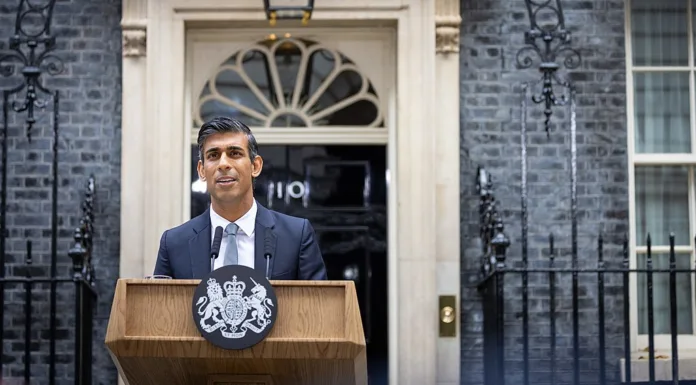Rishi Sunak’s manifesto for the Conservatives hints at strategies to counter potential challenges, with emphasis on tax reductions and scepticism towards environmental initiatives
The release of the Conservative Party’s 80-page election manifesto offers insights into their strategic direction, with notable emphasis on tax cuts and scepticism towards green policies. Rishi Sunak’s launch speech accompanied the manifesto, shedding further light on the party’s priorities and tactics. Here are the key takeaways:
Embed from Getty Images- Tax Cuts Remain Central: Throughout the manifesto and Sunak’s address, the primary message has been the promise of tax cuts in contrast to perceived Labour proposals for tax increases. Notable pledges include the abolition of national insurance contributions (NICs) for self-employed individuals and further cuts to NICs for employed workers. Additionally, there’s a vague commitment to phase out NICs “when it is affordable to do so.” While other tax reductions, such as those for stamp duty and child benefits, were outlined, notable omissions include any mention of inheritance tax, a demand from certain Tory MPs.
- Lack of Bold Initiatives: Despite hopes from some Tory MPs for attention-grabbing policies, the manifesto delivered no major surprises. The absence of significant new proposals disappointed some within the party who had anticipated bold measures to sway public opinion. While there were some minor surprises, such as the details regarding NICs and housing targets, many key policies had been previously announced or discussed. Notably, there was no mention of new policies regarding the UK’s potential departure from the European Convention on Human Rights, a request from some right-wing factions.
- Addressing Populist Concerns: The manifesto reflects attempts by Sunak and his team to address populist concerns, particularly those posed by Nigel Farage and Reform UK. Measures aimed at tempering green initiatives, such as a commitment to avoid new environmental levies and resisting a frequent flyer tax, suggest a response to populist sentiment. Furthermore, proposals to tighten regulations on protests and an extensive section on gender identity underscore efforts to appeal to right-wing constituents concerned about cultural issues.
- Policy Continuity: The manifesto features several policy reiterations from previous agendas, indicating a sense of continuity within the Conservative Party. Proposals linked to Sunak, such as a gradual tobacco ban and reforms to the leasehold system, failed to materialize, while others, like the ban on conversion therapies, were excluded due to perceived complexities in legislation.
- Selective Policy Choices: Despite a range of potential policy options, certain longstanding Tory ideas, such as a ban on conversion therapies, were not revisited in the manifesto. While acknowledging the abhorrence of conversion practices, the manifesto cites existing criminal law as sufficient protection, suggesting a reluctance to delve into the complexities surrounding legislative intervention in this area.
Sky News
Rishi Sunak’s manifesto launch was a comprehensive effort to revive Conservative fortunes in the face of dwindling support, but it fell short of addressing the party’s biggest concern: the tax burden. Despite a 72-page manifesto packed with nearly £20 billion worth of tax and spending commitments, Sunak was unable to promise an overall reduction in the tax burden over the next parliament.
The exclusive Sky News-YouGov poll underscores the challenges facing Sunak, with Conservative voting intentions at a low and significant support shifting towards Nigel Farage’s Reform UK party. While the Labour Party also saw a decline in its vote share, the rise of the Liberal Democrats adds further pressure on the Conservatives.
Sunak’s manifesto covers a broad spectrum of policies, from tax cuts for working families to assistance for first-time homebuyers. However, Labour leader Keir Starmer likened Sunak’s manifesto to that of Jeremy Corbyn, suggesting that popular policies do not necessarily translate into electoral success.
Despite the individual popularity of many proposals, Sunak’s failure to promise an overall reduction in the tax burden undermines the Conservative Party’s reputation for low taxes. His ambiguous response to questions about future tax levels reflects the challenge of reconciling fiscal responsibility with electoral promises.
Sunak’s attempt to portray himself as unafraid to tackle difficult issues may not resonate with voters, particularly as concerns about tax levels persist. With both Sunak and Starmer set to face questions from the public, the upcoming leaders’ event presents an opportunity for further scrutiny of their policy platforms.
The Guardian
The Conservative Party’s election manifesto, spanning 80 pages, highlights key themes and policy directions, offering insights into the party’s strategy:
- Tax Cuts: A central theme of the manifesto is the promise of tax cuts, contrasting with Labour’s proposed tax increases. The manifesto pledges to abolish national insurance contributions for self-employed individuals, further cut NICs for employed workers, and eventually phase out NICs altogether when feasible.
- Lack of Surprises: While some had hoped for bold policy announcements, the manifesto did not contain many surprises. Policy offerings were largely pre-billed, such as increased defence spending, a new national service program, and a statutory cap on migration numbers. Absent were new policies on potentially leaving the European Convention on Human Rights, a demand from some right-wing Tories.
- Populist Elements: The manifesto reflects efforts to counter the threat from Nigel Farage’s Reform UK party, with sections aimed at tempering green initiatives and cracking down on protests. There’s also an extensive focus on gender identity, potentially appealing to certain voter demographics.
- Policy Continuity: Many policies linked to Rishi Sunak did not make it into the manifesto, including measures related to tobacco and vape sales, and compulsory maths study until age 18. However, other proposals, like banning no-fault evictions and leasehold system reform, are resurrected.
- Omissions: One notable absence is the revival of a ban on so-called conversion therapies, with the manifesto citing the complexity of legislation in this area despite acknowledging the practices as abhorrent.
Overall, the manifesto provides a glimpse into the Conservative Party’s electoral pitch, emphasizing tax cuts, populist measures, and continuity on certain policy fronts.
